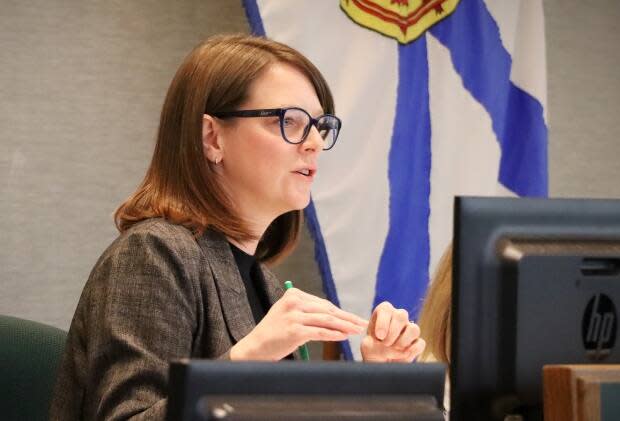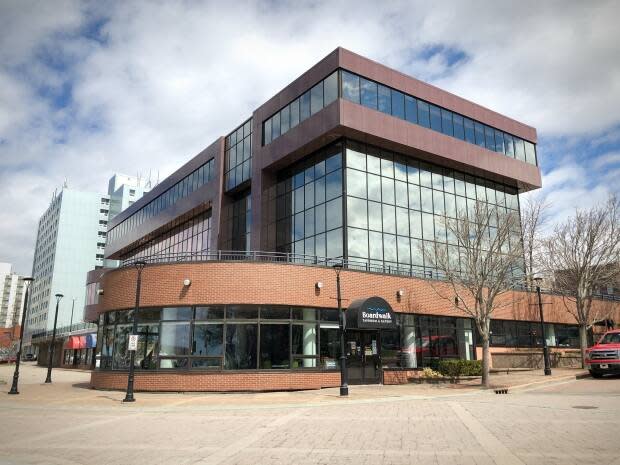Province raises alarm over some of CBRM's financial practices

Nova Scotia's minister of municipal affairs is raising a red flag over some aspects of Cape Breton Regional Municipality's finances, but CBRM officials say things are not as bad as the province is making them seem.
In a letter to the mayor last month, Municipal Affairs Minister John Lohr says six of 12 financial indicators for fiscal year 2020-21 in CBRM are in the medium or high-risk category and he is "particularly alarmed" at three of them.
The minister demanded the municipality provide an action plan within 90 days to address the items, or face losing out on various provincial grants.
In an interview, Mayor Amanda McDougall said the province's view of the financial indicators is unfair, because some of the concerns are longstanding issues that can easily be explained, while others were one-off problems caused by the COVID-19 pandemic.
For example, the minister's concern over uncollected taxes was a direct result of the virus's impact on the economy, she said.
"The municipality was very, very lenient and wanting to make sure that people didn't have to worry about taxes and going onto tax sale lists because of the immense pressure of COVID," McDougall said. "People had lost work, businesses were suffering and that was all part of COVID kind of survival mode."

That is "frustrating," the mayor said, because the municipality was encouraged to take a lenient stand by the province.
The minister also expressed concern about the low levels of CBRM's reserve accounts, which McDougall said has been a longstanding issue related to underfunding.
"We are a municipality that for the first time in 40 years is growing," she said.
"We are a municipality that started with significant debt post-amalgamation."
That debt grew to $160 million, but is now back down around $70 million.
Another concern was reliance on government transfers, which was also an unfair concern in 2020-21, McDougall said, because the Progressive Conservative government came into power and doubled CBRM's capacity grant on a one-time basis with a promise of renegotiating the funding formula with municipalities after that.
"We received a top-up of $15 million the year before and then did not receive a top-up this year and so it shows that we're at a deficit on government funding," she said.
'It is a bit frustrating'
The province still hasn't negotiated a new deal for municipalities, but it is in the works, the mayor said.
"It is a bit frustrating, I won't lie, trying to plan and budget," McDougall said.
"We're entering into budget season and not having that formula in hand, but I think that is indicative of how hard people are working to make sure that that formula is going to be done right."
Most of the financial indicators cited as concerns by the province actually showed improvements in 2020-21 over the previous year.

One that got worse was the municipality's debt service level, but McDougall said CBRM's use of short-term borrowing is done for accounting purposes and has not been a problem in previous years.
She is hopeful a deal will be announced soon and it will mean more money for CBRM.
"I don't think there is an option to not give more," she said.
Every year, the province produces a report on 12 financial indicators for each municipality, covering such things as reliance on government funding, uncollected taxes, reserve accounts and debt and taxation levels.
Five municipalities sent letters
It automatically sends a warning letter to communities with six or more indicators at medium or high risk.
This year, warning letters were sent to five municipalities: CBRM and the towns of Clark's Harbour, Middleton, Oxford and Trenton.
On Thursday, Lohr told reporters the financial indicators are applied uniformly across all municipalities and while there were some positive numbers in CBRM, such as the growth in the tax base, the municipality's uncollected taxes that year were double the provincial average.
""That's a major concern for us, especially for a big municipality like that," Lohr said.
CBRM's uncollected taxes were 13.8 per cent of $96 million, totalling roughly $13.25 million.
The minister also said the province offered a temporary loan program to take into account the uncertain economy, but still expected municipalities to collect taxes.
"There was money advanced in anticipation of maybe having people have difficulty collecting taxes, so we did offer that to every municipality, that there would be 'Hey, we know you may have trouble during COVID, so we'll advance you some money,' which they did take advantage of. But there was never anything about not collecting taxes."
CBRM chief administrative officer Marie Walsh said the coming year's budget is still in the works, but it is expected to include the hiring of an additional tax collector.
MORE TOP STORIES


